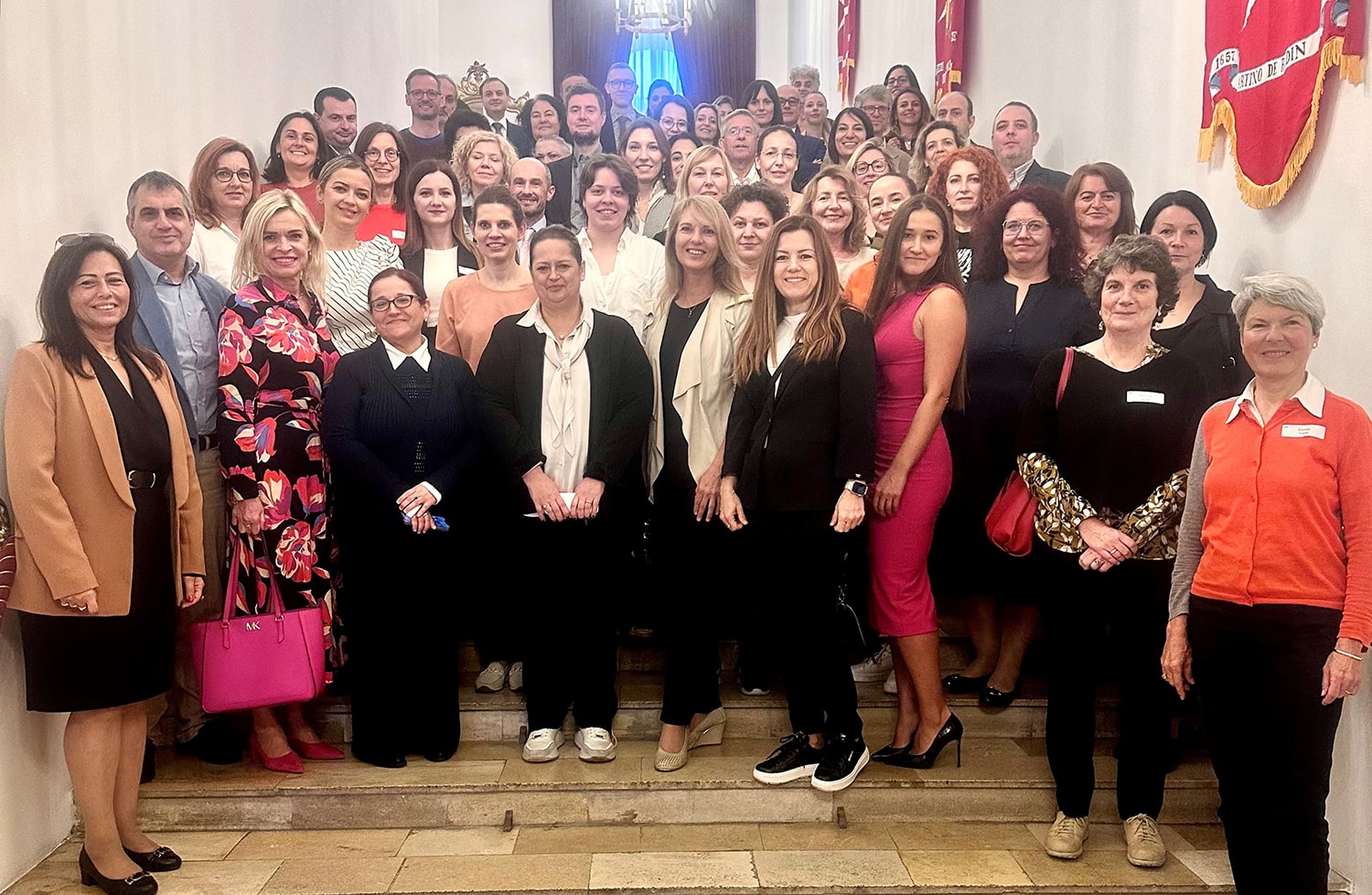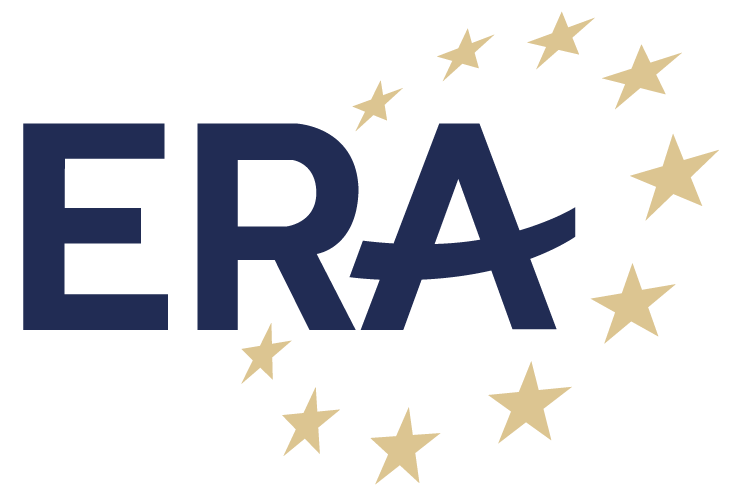Training opportunities for young professionals
ERA Summer Courses
In 2024, ERA provided eight in-person summer courses and six online. In contrast to previous years, we also implemented a hybrid summer course. The hybrid summer course is in high demand, as evidenced by the record-breaking number of participants. A total of 555 practitioners from all EU and EFTA Member States, Western Balkan States, and other regions of the globe attended the 15 summer courses.
The summer courses on consumer law, criminal justice, environmental law, financial market regulation and supervision, and IT law were exclusively offered online and drew a total of 237 participants. The hybrid summer course on EU staff regulations attracted 88 practitioners, while the face-to-face summer courses on antitrust law, data protection law, public procurement law, intellectual property law, labour law, labour mobility, strategic litigation in civil matters, and taxation attracted 228 participants.
Young European
Lawyers Contest (YELC)
The YELC is one of the core elements of ERA’s current strategy to train lawyers at the start of their career. Organised since 2018 in cooperation with CCBE, the aim of the Young European Lawyers Contest, financed under the EU Justice Programme 2021-2027, is to bring together newly qualified lawyers from European countries to highlight the importance of European law for their future legal practice and to put their legal skills to the test in a dynamic environment. Supported by Bars and law schools from 19 different EU Member States, the 2024 contest was composed of 3 semi-finals hosted in the first semester in Bucharest, Strasbourg and Trier, respectively.
Over the course of several months, twelve teams of young lawyers from fifteen EU Member States successfully completed several rounds, including written reports and the oral presentation thereof (semi-finals), a negotiation exercise and for the two finalist teams, a moot court. In the final, held in the esteemed courtroom of the Court of Justice of the European Union in Luxembourg, the two best teams pleaded before judges from the General Court. The best part of this unforgettable experience for young lawyers was to witness jurors sharing their experiences on pleading techniques with their young peers.
Young European
Lawyers Academy (YELA)
The Young European Lawyers Academy (YELA) is a co-funded project designed to complement the Young European Lawyers Contest, whereby its main objective is to raise awareness of cross-cutting areas of EU law. Organised since 2023 with two academies per year, the goal is to enable young lawyers in private practice to use EU law in their daily practice and thereby contribute to the effective and coherent application of EU law across Europe. To give a comprehensive overview regarding salient issues of the EU law, the seminar programme focuses on questions of the rule of law, fundamental rights, EU litigation and data protection among others. Workshops and case studies on each topic are an essential feature of the curriculum. The intensive courses are organised in cooperation with the European Young Bar Association (EYBA) and several national and regional bar associations. During the ten days, participants received intensive training in Trier and visited the Court of Justice of the EU in Luxembourg and the European Court of Human Rights and the European Parliament in Strasbourg. Since 2023, ERA hosted 120 young lawyers from Czechia, France, Germany, Hungary, Romania, Slovakia, Slovenia and Spain.
In 2024, ERA successfully submitted a grant application for the continuation of YELC and YELA in a compiled project. The Young European Lawyers Project will be funded under the Justice Programme.
Large-scale training projects designed for judges and court staff

EU Anti-discrimination Law & EU Gender Equality Law
EU Anti-discrimination Law and EU Gender Equality Law have become pivotal topics in ERA’s programme due to this long-standing EU-funded project. Each year, 600 judges, lawyers, and academics from all EU Member States are trained on how discrimination and gender equality are addressed in EU legislation and interpreted by the jurisprudence of the Court of Justice of the EU. In 2024, twelve seminars were held, nine of which took place outside Trier, hosted by various national judicial schools (including the Czech Judicial Academy, the Bulgarian National Institute of Justice, the Croatian Judicial Academy, the Spanish Centre for Legal Studies, and the Maltese Judicial Studies Committee), national bar or lawyers’ associations (such as the Lithuanian Bar Association and the Danish Association of Employment Lawyers), as well as universities and other institutions (such as the University of Lisbon and the French National Conservatory of Arts and Crafts). Accompanying these courses are numerous online resources available in different languages, including PowerPoint presentations, e-learning courses, and e-presentations.

EU Environmental Law
In 2021, ERA was awarded – for the third time in a row – a four-year service contract to continue a major project on behalf of the European Commission’s DG Environment entitled “Cooperation with National Judges in the Field of EU Environmental Law”. The initiative aims to develop training modules on various topics of EU environmental law as well as to organise workshops for judges. In 2024, ERA implemented eight events in the framework of these specific contracts: one general workshop and one general webinar on EU legislation on wildlife trafficking, deforestation and illegal logging, and combatting associated crimes, both in English; two tailor-made workshops on EU and national legislation on wildlife trafficking, deforestation and illegal logging, and combatting associated crime in the respective national languages, one for Spain and one for Italy; one general workshop on EU legislation on nature protection, in English; two tailor-made workshops on EU and national legislation on nature protection in the respective national languages, one for Spain and one for Romania (the later with simultaneous interpretation to and from English); and one general workshop on access to justice in environmental matters, in English.
Training Project for
Court Staff and Bailiffs
In 2024, ERA continued implementing a training project for court staff and bailiffs in partnership with the European Judicial Training Network (EJTN), the Belgian Judicial Training Institute (IGO-IFJ), the Bulgarian National Institute of Justice (NIJ), the Romanian National School of Clerks (NSC) and with the support of 13 national judicial training institutions and the European Union of Judicial Officers (UEHJ). Building on the knowledge and experience gained from the implementation of previous court staff training projects, the project consortium led by ERA tackled the deficiencies of court staff and bailiffs’ training by adopting a modern and practical approach to EU judicial training and by developing coherent and innovative training packages for future use. The activities dealt with EU civil and criminal law matters as well as digitalisation. Some activities offered legal English language training parallel to legal training thus enhancing the linguistic skills of court staff and bailiffs in legal areas with added practical value. The events were offered in face-to-face, hybrid and online formats. In the second year of the project lifetime 11 pan-European training events were organised and almost 300 court staff and bailiffs had benefited from this project.
Training Project for Court Coordinators
Advanced cross-professional training projects
Moreover, in 2024, ERA kicked off another large-scale project sponsored again by the European Commission entitled “Judicial training to prepare criminal justice professionals for #digitalisation and #artificialintelligence”. It consists of 12 seminars to take place in various EU cities over the period 2024-2027. On 26 and 27 September 2024 the first event took place in Lisbon in cooperation with the Portuguese Centre of Judicial Studies
Tailor-made training courses
In 2024, ERA together with EJTN implemented 14 online training events for the European Public Prosecutor’s Office under a framework contract that is now in its fourth year. The webinars, which were offered exclusively to European Delegated Prosecutors and staff of the EPPO, covered issues related to financial investigations, EU funding, forensic accounting and the use of analytical tools in the context of EPPO cases. The year 2024 was also the last year of the four-year service contract that EJTN and ERA carried out for the EPPO. Over the four years, 57 online training sessions were delivered to EPPO staff, covering legal, operational and language skills. Numerous recordings were made available on the EPPO training platform. In addition, the EJTN-ERA consortium re-applied for the second call for tenders to provide training for EPPO staff from 2026 onwards. The consortium is proud to announce that it has been awarded this second four-year service contract in early 2025.
A seminar on EU Equality Law was organized by ERA for the Northern Ireland Human Rights Commission (NIHRC) and took place in Belfast. Under the UK-EU Withdrawal Agreement, Northern Ireland remains bound by certain EU standards post-Brexit and must maintain dynamic alignment with six of the main EU Equality Directives. The NIHRC has a mandate to oversee the implementation of the human rights and equality aspects of those commitments, necessitating detailed knowledge of EU law. Digitalisation at work (platform workers) organised in cooperation with the Hungarian National Office for the Judiciary.
Children’s rights and protection of children – one seminar for judges and one for
court staff organised for the Judicial Studies Committee of Malta.
ERA started into 2024 by organizing two seminars on children’s rights and the protection of children for the Judicial Studies Committee of Malta. One of the seminars was aimed at judges while the other focused on court staff. The content of both seminars, however, was similar. During one day, the participants were introduced to the general sources of children’s rights in international law, including the UN Convention on the Rights of the Child, the Lanzarote Convention of the Council of Europe and pertinent EU legislation. Each seminar was accompanied by a case study to implement the acquired knowledge in a practical setting.


